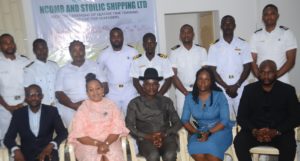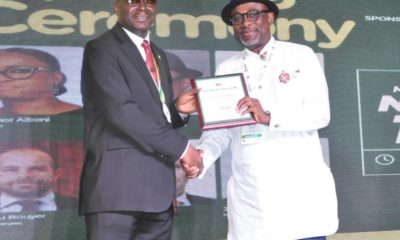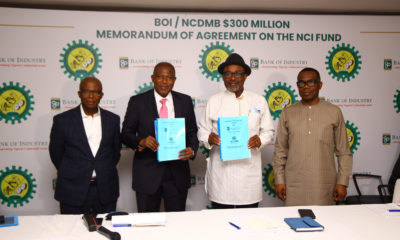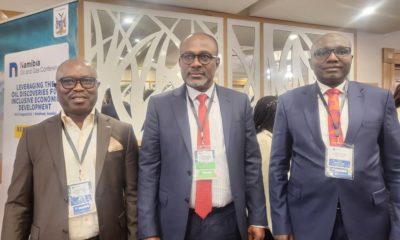Energy
NCDMB, STOILIC SHIPPING PARTNER TO SEND 10 CADETS ON SEA-TIME, COC TRAINING

…As Wabote Applauds Stoilic Shipping for Showing Commitment to Developing Indigenous Capacity
…Nigeria Can Generate Huge Revenue By Producing Seafarers- McFoy
The Executive Secretary of Nigeria Content Development and Monitoring Board (NCDMB), Engr. Simbi Wabote has commended the Management of Stoilic Shipping Limited for its commitment to growing indigenous Capacity for the Nigerian maritime sector adding that the partnership between both bodies would only usher in further progress for the Nigerian maritime industry.
Engr. Wabote who was speaking as NCDMB and Stoilic flagged off a full-scholarship sea-time training for 10 cadets in Lagos today, reassured on the Board’s commitment to growing capacity for the Maritime Industry adding that the agency takes the training very seriously even as he noted that maritime trainings are cost intensive and would only take the commitment of parties involved.
The Executive Secretary who was represented by the Board’s Manager, Human and Capital Development, Mr. Timbiri Augustine, said that the conduct of the trainees has an implication on the country advising them not to be distracted at any point as they may face mild challenges such as turbulent weather, different environments, language barrier amongst others in their period of learning.
In his words, “We are building capacity and capability, but we are not limiting the utilization of this capacity to the Nigerian maritime and oil gas industry. The training is the type that will take you to other countries and different ports and therefore commitment is very critical, because the standard in view is a global factor, not Nigerian factor.”
Speaking further, he commended Stoilic Shipping for their commitment to the programme and re-emphasized the Board’s drive to the sustenance of the partnership.
On her part, the Executive Director of Stoilic Shipping, Mrs. Irene McFoy, charged the cadets to “change the dynamics of shipping companies not wanting Nigerian seafarers by stepping up the standards.
She assured the cadets that the company and its technical partners would take them through many training modules and placed them on ocean-going vessels, where they must start preparing for their CoC.
Mcfoy also urged the trainees to interact, be humble and learn from their teachers, comply with the rules, safety guidelines and all given ethical values of the maritime profession and their particular field.
According to her, the company, as a major private sector leader, “wants Nigeria to be one of the foremost countries supplying seafarers to the international maritime industry just like the Philippines.”
Noting that at least 28 per cent of the Philippines’ revenue comes from seafaring, McFoy, who was in charge of the cadet training at the Nigerian Maritime Administration and Safety Agency (NIMASA) before retiring, insisted that “there is nothing stopping Nigeria from being the best, or even better than the Philippines.”
She commended NCDMB for the partnership and re-emphasized that Nigeria is a littoral state, that has the manpower and the intelligence. She said that all the country needed is to get these students properly harnessed and Nigeria will do very well in the maritime sector.
Also, the Managing Director of Stoilic Shipping, Mr. Lotanna, urged the cadets to write their names in gold and always remember where they are coming from, he charged them not to be discouraged and tired and to always remember that there are many fellow graduates out there who yearn for this opportunity.

Sitting from left, Supervisor, Human Capital Development, (NCDMB), Sallahudeen Muhammad, General Manager, Operations, Stoilic Shipping Limited, Mrs Irene Mcfoy, Manager, Human Capital Development, (NCDMB), Timbiri Augustine, General Manager, Administration, Stoilic Shipping Limited Chinamanda Mcfoy, Managing Director, Stoilic Shipping Limited, Lotanna and Beneficiaries during the opening ceremony of the seatime training certificate of competency (COC) by stoilic shipping limited awarded by NCDMB for seafarers, in Lagos, on Tuesday.
Energy
SNEPCo, Former MD Aiboni Win Energy Times’ Awards

The Shell Nigeria Exploration and Production Company (SNEPCo) has been named Major Oil Company of the Year for last year by a Nigerian publication, Energy Times.
Biztellers reports that this is in recognition of the company’s contributions to deep-water oil and gas development and the industry generally.
Energy Times also awarded the title of Amazon of Nigeria’s Oil Sector for 2024 to Elohor Aiboni, a former Managing Director of SNEPCo now on international assignment in Brunei.
The awards were presented to SNEPCo’s Senior Operations Manager, Bolanle Odunayo-Ojo, who represented the Managing Director, Ronald Adams at a ceremony attended by key stakeholders in the oil and gas sector.
ALSO READ: BREAKING: Again, Dangote Cuts Petrol Price To N835 per Litre
“We are honored to receive the recognitions for the company and our former Managing Director as they underscore our dedication to excellence in the upstream sector,” Bolanle stated. “The modest achievements are result from teamwork and support by our partners, particularly the Nigerian National Petroleum Company Limited and regulatory agencies. The awards encourage us to continue to work together to power progress and innovation in Nigeria’s energy landscape.”
The SNEPCo has been a pioneer in Nigeria’s deep-water oil and gas production since it began production from Bonga in 2005, Nigeria’s first deep-water well. Gas from Bonga is also piped to Nigeria Liquefied Natural Gas Company Limited at Bonny Island. SNEPCo’s operations have led to significant discoveries, including Bonga Southwest in 2001 and Bonga Northwest, which began production on August 5, 2014.
In its award, the Board of Directors of Energy Times pointed to the continuing success of Bonga, notably production of the 1 billionth barrel of oil in February 2023 and the recent Final Investment Decision on the $5 billion Bonga North project.
The award on Aiboni’s highlights a career that has seen her serve in various business and leadership roles within and outside Nigeria. She was appointed Managing Director of SNEPCo in 2021 and led initiatives that deepened operational efficiency, local content development and social investment projects across the six geopolitical zones in the country.
Energy
Shell Commends Oloibiri Lecture Series As Platform For Change

Shell Nigeria Exploration and Production Company Ltd (SNEPCo,) one of the sponsors of the Oloibiri Lecture Series and Energy Forum (OLEF) has commended it as a platform for driving change in Nigeria’s energy sector through the discussions that centre on business performance, cost discipline and process simplification.
“This event is special to the Shell brand, not only because of the nostalgia of Oloibiri but the quality of discourse it has enabled in our sector over the years,” SNEPCO Managing Director Ronald Adams said in a goodwill speech delivered by General Manager, Wells and Geosciences Operations Joe Mordi. He said: “We are grateful to the Society of Petroleum Engineers and our host the Petroleum Technology Development Fund (PTDF) for another successful outing.”
Organised by the Society of Petroleum Engineers (SPE) Nigeria Council, the Oloibiri Lecture Series and Energy Forum began in 1991, in commemoration of the country’s first commercial oil discovery by Shell at Oloibiri, Bayelsa State, in 1956. Ronald said recent developments in the Upstream and Downstream sectors of the energy industry, including the $5-billion final investment decision by Shell in the Bonga North Deepwater project echoed the sentiments around the first oil discovery.
ALSO READ: No Safety Guarantee For Unscheduled Visitors To Benue – Gov Alia
He noted that, “These strides come with a commitment to excellence required of us – for stakeholders, colleagues, our country and indeed, future generations. The theme for this year ‘Driving energy sustainability through technology, policy and supply chain excellence’ reflects this commitment. The future is bright, and we have the opportunity to co-create it.”
Energy
NLNG Improves Nigeria’s Domestic LPG Supply Efficiency

In line with its continuous improvement culture, the Nigeria LNG Limited (NLNG) will be working closely with its stakeholders to improve operational efficiency in its domestic Liquefied Petroleum Gas (DLPG) supply in Nigeria.
According to a statement from its General Manager, External Relations and Sustainable Development, Sophia Horsfall, this was highlighted at an engagement session with stakeholders in Lagos.
It was gathered that the NLNG plans to enhance engagement and improve operational efficiency of its LPG supply through digitalisation of some of its processes which include a new platform designed to streamline regulatory processes, optimise risk management, and enhance the buyer experience. The platform will feature IT-supported relationship management, automated issue resolution, centralised real-time payments, and improved case management systems, ensuring a seamless supply process despite market shifts and external pressures.
ALSO READ: Ifon-Ilobu Crisis: Adeleke Assures Of Quick Restoration Of Peace
Manager, Commercial Contract Management, NLNG, Tolulope Longe, reiterated that the planned improvements will enable and consolidate NLNG’s resolve to delivering 100% of its LPG supply to the Nigerian market.
She said a strategic roadmap was in play to ensure the achievement of NLNG’s longstanding goals of LPG being accessible and available in the country, aligning with its vision of being a globally competitive energy company, improving lives sustainably. She also harped on the significance of these improvement initiatives and the Company’s push for LPG utilisation as a clean energy source alternative to kerosene and other fossil fuels
Longe noted that the Company remained focused on growth and sustainability of the LPG market by continuously enhancing its supply processes in collaboration with offtakers. She stressed NLNG’s commitment to collaborating with stakeholders to maintain pricing stability and long-term market viability. While acknowledging industry concerns, she noted the importance of operational efficiency in meeting market demands.
NLNG aims to strengthen stakeholder engagement and improve market efficiency in the LPG sector through enhanced customer interactions, minimised schedule disruptions, timely confirmations and deliveries, and prioritisation of customers with demonstrable capacity. As it adapts to market realities, NLNG remains committed to driving sustainability and delivering lasting value to Nigerians.






















